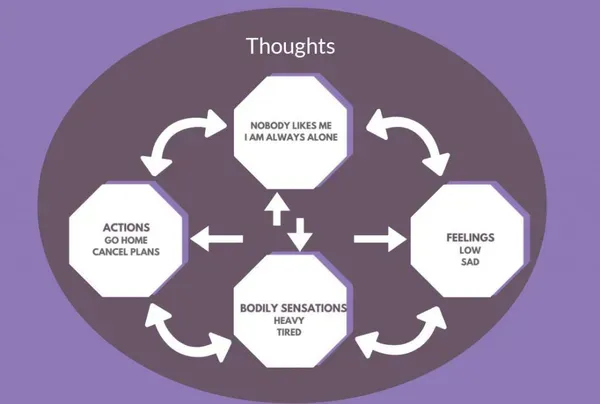-Our Approach-
Lorem ipsum dolor sit amet, consectetur adipiscing elit. Fusce ut elementum elit. Nulla pharetra sem id nisi ornare, eget porta eros vehicula. Morbi vel nisl finibus, porta lacus eget, lobortis enim. Vivamus laoreet ligula ut ipsum sagittis lobortis. Lorem ipsum dolor sit amet, consectetur adipiscing elit. Etiam vitae enim vitae augue pretium rutrum non eget ex. Vestibulum a tellus a turpis condimentum sodales et et odio. Nam iaculis dignissim nunc ut fermentum.

What is CBT Therapy?
CBT therapy also known as cognitive behavioural therapy which is a form of therapy that has been scientifically proven to improve many psychological difficulties.
How CBT Therapy Can Help You?
Anything from anxiety disorders such as general anxiety, OCD (obsessive compulsive disorder) PTSD (Post traumatic stress disorder) to Stress and Depression, Low self esteem and severe emotional difficulties. CBT looks at the links between our thoughts, feelings, bodily sensations and actions: In any given situation all of these elements are interlinked with each other and influence each other. So by changing the way we think about something, or the way we act in a situation, we can change the way we feel, both emotionally and physically about that situation. And situation after situation we can change our lives for the better.
What we think and what we do affect the way we feel, which in return affects what we think and the way we act. Therapy looks at identifying unhelpful thinking patterns and unhelpful behavioural patterns, experimenting new behaviours and challenging unhelpful thoughts. The therapy is present and future focused while past experiences are explored when they present a block in moving forward in the present.

What is Mindfulness?
Mindfulness is defined as the ability to pay attention, on purpose to the present moment in a non-judgemental way (J.K.Zinn, 2017).
How Mindfulness can help you?
Statistic shows that we spend as much as 80% of our waking life on autopilot- this being doing something while thinking about something else, not really in contact with what we are doing, lost in our thought of work, problems, what to do next, what we have just done.
Have you ever read a book just to realise at the end of the page that you have no idea what you just read? have you ever talked with someone just to realise you lost half of the conversation?, or driven to a familiar place and have no recollection of the road just done? You were on autopilot. Don’t get me wrong, autopilot can be useful. For example you do not want to reflect on how to stop the car every time you see a red traffic light. However, often our mind spiral into negative thoughts, self criticism or concerns at any time, while doing anything so we miss out on playing with the kids, we are lost for half of our meeting or class or we only enjoy part of our well deserved evening with friend just because our mind is somewhere else.
Mindfulness trains the mind to be focused of what is happening in the present, being that good or bad to actually being present into our life. It teaches a new relationship with thought where we can just observe them without having to react to them or even believing them. Because thought are in our heads, we take them for truth, but they are not truth, they are not fact, they are merely thoughts that we can learn to use if and when we want to use them without being overwhelmed them.
In our workshop and short Mindfulness courses you will learn more about mindfulness and start practicing it to experience the enormous difference that being present into your own life can make.

What is ACT Therapy?
ACT therapy also known as Acceptance and Commitment Therapy which is a third wave development of CBT. It is mainly a behavioural approach which incorporates Mindfulness to create a different relationship with painful thoughts and feelings.
How ACT Therapy Can Help You?
Rather than challenging unhelpful thoughts as in CBT, ACT teaches to observe the thought as a mental event, unable to hurt you and to which you do not have to act upon.
ACT takes the idea that thoughts are thoughts, not facts; to the next level by underlying the fact that people have always a choice to act in line with their values and learn to distance from thoughts (including memories) that are unhelpful or hurtful. The mindfulness training is an essential part of the therapy as it creates the ability to separate the person from the thoughts.
Another essential element of ACT are values, which in therapy are identified and used to guide and motivate behavioural change. The Acceptance part of ACT, has nothing to do with giving up. Instead, it is about learning to ‘make room’ (accept mindfully) for unpleasant emotions, feelings and thoughts; when doing so enables you to achieve something important that otherwise you would have avoided, to move in the direction of your values.
The ultimate goal is to be able to live a full and meaningful life, while being able to experience the unpleasant emotions that life necessarily brings with it. ACT is particularly beneficial in moments of crisis when the true direction and purpose of life might be lost.

What is Coaching ?
Coaching is a form of therapy that focuses on a specific area of a person’s career or life.
How Coaching can help you?
Coaching helps to identify what is important for a person, what he or she would like to achieve in their career/life, what direction s/he wants to take from this point onwards. The work also focuses on identifying limiting beliefs , unhelpful behaviours and difficult emotions that get in the way of moving in the chosen direction.
Creating a growth mindset to see problems as challenges and opportunities for growth, developing an expertise in the chosen area and identifying what practical help is needed or available are all part of making a structured plan towards our goals.
From Dream to Reality-
A DREAM written down on paper becomes a GOALA GOAL broken down in to steps becomes a PLANA PLAN backed up by actions becomes REALITY

What is Emotion Focused Therapy-EFT?
Emotion Focused Therapy-EFT is a model of therapy based on attachment theory, where interdependence is at the core of a healthy relationship. As a child’s happiness is due to a healthy attachment to parental figures providing a sense of security, so in adults this attachment translates to their chosen partner.
How Emotion Focused Therapy-EFT Can Help You?
We all need to feel safe and loved in a relationship to be able to open up, our relationship needs to be a secure haven where to return regularly to recharge after facing the world on our own.
We depend on each other for this sense of safety and we protest (over household chores, or lack of attention) or retract (to protect ourselves) when we feel this security is not present.
EFT works by uncovering this need for a secure attachment in adults.Recognising the protest-retract pattern and sharing needs and vulnerabilities will bring the partners closer creating a team of two that faces the world and its difficulties together and is more attentive to each other’s needs and desires.

What is Educational Psychology?
Educational Psychologists are specially trained professionals who use their knowledge about children’s development as well as their understanding of learning habits and retention strategies, to explore how to support children and young people to access learning and achieve their maximum potential.
Our Educational Psychologists use observations, consultations and assessments, wherever it is needed, to explore each child’s needs and strengths that can support the child development and learning.
We provide a bespoke service that considers the children/young person and their family needs. This can be a one-off assessment or ongoing follow-up advice and reviews for parents and/or schools, which could include workshops and training.
How Educational Psychology Can Help You?
You may would like your child/young person to see an Educational Psychologist if they find it difficult to keep up with their learning and homework for different reasons, which might include difficulties with: understanding, memory, attention, literacy and/or numeracy, emotion regulation and social relationships.

